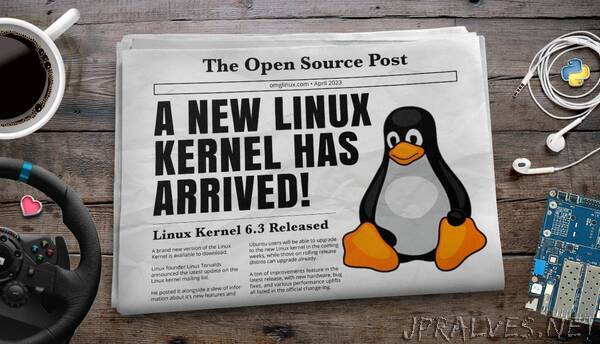
“A new version of the Linux kernel is out with an assortment of hardware, performance, and security improvements.
Announcing the release of Linux 6.3 over on the Linux kernel mailing list (LKML) Linus Torvalds remarked “…here we are, right on schedule, with the 6.3 release out and ready for your enjoyment”.
So what’s new?
Let’s take a breezy whip (and I do mean breezy) through the new n’ notable.
Linux 6.3: New Features
As you’d expect Linux kernel 6.3 features a ton of enablement and support for upcoming and yet-to-be-released CPUs and graphics hardware from Intel and AMD. As exciting (and necessary) as these are they’re a bit hard to feel hype for when, y’know, few people will benefit right away.
Thankfully there are lots of changes that do have a more direct impact on our day to day usage.
A notable AMD-related change in Linux 6.2 is support for AMD’s automatic IBRS feature Spectre mitigation. This offers less of a performance hit than the retpoline speculative execution that is often used at present.
Elsewhere in architecture land, new power management drivers for ARM and RISC-V ship in Linux 6.3. The latter also picks up support for accelerated string functions (by way of the Zbb bit manipulation extension) and the former gains support for scalable matrix extension 2 instructions.
In filesystems, the NFS filesystem (both the client and server sides) now supports AES-SHA2-based encryption; optimisations to EXT4 direct I/O performance; low-latency decompression for EROFS, and a faster Brtfs file-system driver.
Hardware support brings in a native Steam Deck controller interface in HID, allows the Logitech G923 Xbox edition racing wheel to work on Linux; improves the behaviour of 8BitDo Pro 2 wired controllers; and adds sensor monitoring for an array of ASUS’ Ryzen motherboards.
Other highlights:
- User-mode Linux supports Rust code
- Realtek RTL8188EU Wi-Fi adapter
- Support for Qualcomm Wi-Fi 7 wireless chipset
- Ethernet support for NVIDIA BlueField 3 DPU
- Multi-path TCP can handle mixed flows using IPv4 and IPv6
- New hardware noise tool
- KVM support for Hyper-V extended hypercalls
Finally, a slew of single-board devices benefit from updated drivers, including the BannaPi R3 and BPI-M2 Pro, and the Orange Pi R1 Plus (oft mentioned as a true Raspberry Pi 4 alternative). Additionally, more than 150,000 lines of code to support (ancient and unused) ARM boards were removed in this update.
As aways, I definitely recommended poring over LWN’s comprehensive merge window roundups for more details (and often links to further information about what specific changes mean). You can find part 1 here and part 2 here. Also worth a read is Phoronix’s blow-by-blow feature roundup.”
